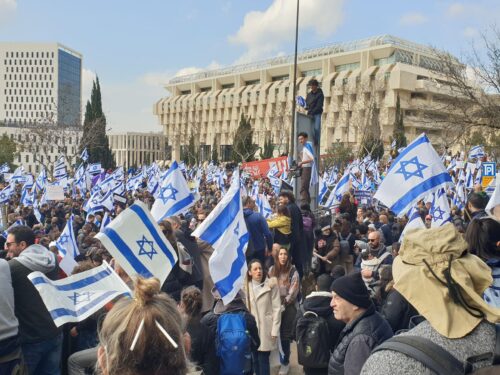
In the year that has passed since the outbreak of the Swords of Iron War, the State of Israel has been grappling with an historic challenge requiring total national mobilization. Without such a mobilization, we are not going to be able to share the burden properly over time, and we are bound to burn out the few servicemen and women who are currently doing reserve military service.
The solution to this crisis within the reserve military lies in two main areas: the first is augmenting the pool of servicemen and women through measures such as recruitment of additional populations, extending the retirement age from reserve military service, and granting substantial benefits to servicemen and women, including in housing.
However before we get down to the solutions, one must first understand how this severe crisis arose in the first place – a crisis in the State of Israel’s most important defensive apparatus.
The military reserve force: Problems
A small, smart army? Not in Israel’s circumstances
In the early 1990s, with the fall of the Iron Curtain. there was a feeling the world was heading into an agreement-oriented reality, in which there will be no more large-scale world wars. This optimism filtered down to Israel as well, where it drove various political processes like the signing of the peace treaty with Jordan, and later on the signing of the Oslo Accords.
Along with these moves, the conviction that there are not going to be any more large-scale wars brought about a change in the nature of the IDF. The Israeli military began focusing on localized operations and, as a consequence, it placed its main emphasis on developing the Air Force and the special forces, and on procurement of precision weapons. At the same time, more and more commanders that got promoted to key positions in the IDF came from the special forces. This served to reinforce the concepts of reliance on special operations.
Besides the intra-military processes, various politicians promoted the notion of a “small, smart military” – meaning an army less reliant on manpower and more reliant on technology. According to this concept, the regular army and the reserve army got substantially downsized over the years. This gave rise to two significant vulnerabilities: the first is the functional capabilities of the Israel security forces – the trimmed-down order of battle led to a reality in which nowadays only a small percentage of the entire Israeli population serves an active reserve military service, which creates a burden disparity and at the same time prevents the security forces from waging large-scale warfare on multiple fronts. This is the reason why the Swords of Iron War is taking so long. The second impact is hardly ever mentioned, since it is a creeping impact. However to my mind it is more severe than the first: erosion of the ethos of the mobilized nation – an ethos that has been with us since the inception of the State, which recognized the importance of the contribution to be made by each and every citizen.
In this context it is worth mentioning that the downsizing of the IDF manpower and the defensive organs within the settlements and communities is not the sole factor that erodes the mobilized society ethos and the ethic of service, on which the State of Israel had been based in the past. In recent years we have been witnessing an alarming process of politization of the security forces. One such example was evident a mere year and a half ago, when as part of the conflict over the judicial reform, many reservists, including senior Air Force pilots, refused to show up for duty. As a society, we have got to understand that the security of the State of Israel supersedes all else. Security issues must not be mingled with political considerations.
The military reserve force: Solutions
Comprehensive national mobilization
As mentioned, nowadays only a small percentage of Israeli society does active reserve military service. This disparity cannot be sustained for long. We must recall what had been so clearly obvious in the early days of the State – that in order to sustain the State of Israel, the entire Israeli society has got to do its share.
The goal is to see a mobilized nation – whether in conscription service or in the reserves, whether in a civilian national guard, which is an issue in and of itself. If there will indeed be a comprehensive national mobilization, including within populations that currently do not serve, then each citizen will be required to do reserve military service for two to three weeks every year and the burden, when distributed equitably across the board, will be relatively lighter. It is important to emphasize that the burden sharing is vital not merely for practical reasons, but also for ethical reasons. Such sharing constitutes a degree of social justice – signaling that we are all equal and that we are all working together for a common goal.
Genuine support for those who serve
The Israeli public, for the most part, is deeply appreciative of the reservists. However it is also important that the State should prove its appreciation of their contribution by compensating them accordingly. To make it clear just how important the reserve military service is, the State has got to work in two main thrusts.
The first is the ethical thrust – this is a long-term process that begins in the earliest stages of the education system. It is intended to institute the service ethos. A comprehensive study in the field of education, conducted by the IDSF among hundreds of teachers and schoolchildren in Israel shows that the education system barely deals with the national ethos and with matters concerning Israeli society, knowledge of the land and preparation for military service.
The second is the practical thrust – the State has got to prove, through its actions here and now, that it is appreciative of the reservists and that it supports them.
Already now the State and the IDF grant the reservists benefits in accordance with the number of days served, however due to cumbersome processes and communication problems, the serving reservists are not always aware of their entitlements and they are not always able to benefit fully from them. Besides these impediments, there is also scope for improving the benefits given to the reservists and to offer them opportunities transcending the financial benefits. Thus for example, the families of the servicemen, which pay a heavy toll as well, ought to be given support – one thing would be to make sure that the spouses, who stay at home and need to care for the household and children receive assistance, another thing would be to provide the servicemen’s children subsidized psychological therapy as needed, and even to offer the spouses themselves marital counseling to help them get through these challenging times.
Another important benefit should be concessions in housing and land in areas of strategic importance. This idea, as will be shown in the next section, represents a clear convergence of interests both of the reserve military servicemen and women and of the State.
Housing solutions in areas of strategic importance
We have got to place the reserve military servicemen and women at the top of the list of priorities when it comes to housing while leveraging the State of Israel’s strategic interests. The point is to grant them substantial discounts for the purchase of land and housing in the Negev and Galilee – areas of great strategic importance for Israel. Additionally, in these areas, neighborhoods dedicated to the reserve military servicemen and women should be built, just as special neighborhoods get built for ultra-Orthodox Jews or for new immigrants.
Such an initiative will also be of value to the servicemen and women themselves, helping them achieve decent housing solutions. It will also increase the motivation to serve, and it will advance Israel’s interests of populating those regions with a high-quality, robust people. Obviously the State must also work to develop the infrastructures in these areas with special emphasis on opening employment centers and on developing a high-quality education system.
This idea has already been put on the table and the State has even declared that it would grant substantial discounts for the reserve servicemen and women for the purchase of lands in the Negev and in the Galilee, however there is an insufficient supply of land and apartments, and there is no clear communication between the State and the servicemen and women, resulting in most of them not knowing how to exercise their entitlements.
We at the IDSF regard affordable housing for the reservists in the Negev and Galilee to be a national mission of the first order. We have therefore decided to actively promote this idea. To this end we are conducting registration of reservists interested in living in the Negev and Galilee, in order to prove that there is indeed demand and to build a purchase group. At the same time we are in touch with the government ministries and with mayors in the Negev and Galilee to advance land allocation and the construction of neighborhoods for reserve military servicemen and women.
Summary and conclusions
The solution for the profound reserve military service crisis begins with a return to the seminal ethos that has been with us since the establishment of the State – the ethos of the mobilized nation. First and foremost there has to be equitable sharing of the burden, and populations need to be recruited into the conscription and reserve army, which so far have not been recruited.
Beyond distributing the burden, the State must support the reservists and their families. They must be granted financial benefits, including sizable discounts in the purchase of land in the Negev and Galilee. Such an initiative would signal to the reservists that their service is being appreciated, it will increase the motivation to serve, and it will also make a positive contribution toward the settlement and security interests of the State of Israel.







